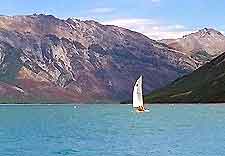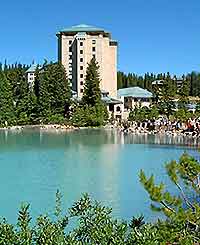Banff Weather, When to Go and Climate Information
(Banff, Alberta - AB, Canada)

With summer festivals and winter sports, the Banff townsite is a true year-round destination and features distinct seasonal weather. The summer climate in Banff is influenced by its proximity to the Canadian Rocky Mountains, which offer a range of recreational activities throughout the year.
Pleasant springs in Banff lead onto a warm and appealing summer climate, with fall being quickly followed by cold winter weather, known for its heavy snowfalls and frosty conditions.

Spring
As the alpine meadows begin to awake after their winter dormancy, spring heralds the start of the fine weather and climate in Banff. Although occasional snowy weather can occur in late spring, temperatures soon begin to rise, with average daytime temperatures in March remaining well above freezing, rising to more than 10°C / 50°F in April. However, night times in Banff remain cold and frosty at this time of the year.
Summer
Summer is always a busy time in Banff and the fine climate and warm, sunny weather offers many midsummer festivals and outdoor concerts around the Banff townsite. The best weather in Banff is between July and August, with peaks of up to 25°C / 77°F on occasion. In the height of summer, the daylight hours in Banff are extremely long and it can stay light until 23:00. Contrasting with the hot daytime weather, nights remain chilly and when partying late at night during Banff's summer months, be sure to bring a jacket or coat.
Autumn / Fall
The landscape begins to change dramatically as fall approaches in Banff, with spectacular autumnal shades throughout the surrounding countryside and Canadian Rockies. Although daytime temperatures in October remain mild, averaging above 10°C / 50°F, the nights feel more winter like and can feature sharp frosts.
Winter
The winter weather and climate in and around the Banff townsite is the beginning of the area's exciting winter sports, which include truly world-class skiing. Banff's renowned snowy weather creates the perfect conditions, known locally as 'champagne powder', with the light snow being ideal for both skiing and snow boarding. February is generally the coldest month in Banff, with frosty weather on most days and temperatures rarely reaching above freezing.
Banff Weather and Climate Chart (Averages)
| |
Maximum |
Minimum |
January |
0°C / 32°F |
-12°C / 10°F |
February |
-2°C / 28°F |
-15°C / 5°F |
March |
5°C / 41°F |
-6°C / 21°F |
April |
10°C / 50°F |
-3°C / 27°F |
May |
15°C / 59°F |
0°C / 32°F |
June |
17°C / 63°F |
4°C / 39°F |
July |
21°C / 70°F |
6°C / 43°F |
August |
22°C / 72°F |
7°C / 45°F |
September |
17°C / 63°F |
2°C / 36°F |
October |
11°C / 52°F |
-3°C / 27°F |
November |
5°C / 41°F |
-7°C / 19°F |
December |
-1°C / 30°F |
-12°C / 10°F |
 With summer festivals and winter sports, the Banff townsite is a true year-round destination and features distinct seasonal weather. The summer climate in Banff is influenced by its proximity to the Canadian Rocky Mountains, which offer a range of recreational activities throughout the year.
With summer festivals and winter sports, the Banff townsite is a true year-round destination and features distinct seasonal weather. The summer climate in Banff is influenced by its proximity to the Canadian Rocky Mountains, which offer a range of recreational activities throughout the year.